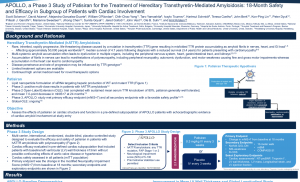Alnylam Pharmaceuticals announced the publication of the pivotal study results from the APOLLO Phase 3 trial of patisiran in The New England Journal of Medicine (NEJM). The study showed that patisiran improved measures of polyneuropathy, quality of life, activities of daily living, ambulation, nutritional status, and autonomic symptoms relative to placebo in patients with hereditary transthyretin-mediated (hATTR) amyloidosis, an inevitably progressive and generally fatal disease. Patisiran treatment also led to favorable effects on exploratory endpoints related to cardiac structure and function in patients with cardiac involvement. Further, the frequency and severity of adverse events (AEs) were similar in patients receiving patisiran and placebo, with the exception of peripheral edema and infusion-related events which were higher in patisiran-treated patients and generally mild to moderate in severity. The full manuscript, titled “Patisiran, an RNAi Therapeutic, for Hereditary Transthyretin Amyloidosis,” will appear in the July 5, 2018 issue of NEJM.
“The publication of the APOLLO study results in NEJM underscores the potential for clinical benefit and the encouraging safety profile of patisiran, and reinforces the strong therapeutic potential of this investigational medicine for people living with hATTR amyloidosis,” said David Adams M.D., Ph.D., Department of Neurology, Coordinator of the national reference center for Familial Amyloid Polyneuropathy (FAP) and rare neuropathies, Bicêtre Hospital, Greater Paris University Hospitals, AP-HP, Principal Investigator for the APOLLO trial, and lead author of the manuscript. “The positive impact on both neurologic impairment and quality of life in patients treated with patisiran was in marked contrast to the disease progression seen in placebo-treated patients in just 18 months. In fact, we observed improvement in neuropathy manifestations and quality of life in a majority of patisiran-treated patients, with some patients showing evidence of halting or reversal of neuropathy progression during the study, including a transition from assisted to unassisted walking. The broad, international patient population recruited to APOLLO is characteristic of the wide disease spectrum seen in clinical practice, supporting the relevance of the potential beneficial effects of patisiran for patients worldwide afflicted with this progressive and generally fatal disease.”
The APOLLO study publication presents robust evidence for patisiran’s potential to treat a broad constellation of hATTR amyloidosis clinical manifestations and their disabling effects. Relative to placebo, data from APOLLO showed that treatment with patisiran resulted in significant and clinically meaningful improvements in measures of polyneuropathy and quality of life. In addition, compared to baseline and after 18 months of patisiran treatment, improvement was observed in a majority of patients in the primary endpoint, mNIS+7 score (a composite measure of neuropathy), and in the key secondary endpoint, Norfolk QOL-DN (a quality of life questionnaire). The improvement in mNIS+7 was shown to be correlated with degree of TTR knockdown. Significant effects on muscle strength, activities of daily living, ambulation, nutritional status, and autonomic symptoms were also noted in patisiran patients relative to placebo. Moreover, patisiran patients with echocardiographic evidence of cardiac amyloid involvement at study entry demonstrated favorable effects on exploratory endpoints related to cardiac structure and function when compared to placebo.
About the APOLLO Phase 3 Study
The APOLLO Phase 3 trial was a randomized, double-blind, placebo-controlled, global study designed to evaluate the efficacy and safety of patisiran in hATTR amyloidosis patients with polyneuropathy. The primary endpoint of the study was the change from baseline in modified Neuropathy Impairment Score +7 (mNIS+7) relative to placebo at 18 months. Secondary endpoints included: the Norfolk Quality of Life-Diabetic Neuropathy (QOL-DN) score; NIS-weakness (NIS-W); Rasch-built Overall Disability Scale (R-ODS); timed 10-meter walk (10-MWT); modified BMI (mBMI); and the composite autonomic symptom score-31 (COMPASS-31). In addition, exploratory cardiac assessments included measurement of N-terminal pro-brain natriuretic peptide (NT-ProBNP) levels and echocardiography. The trial enrolled 225 hATTR amyloidosis patients in 19 countries with 39 genotypes who were randomized 2:1, patisiran:placebo, with patisiran administered at 0.3 mg/kg intravenously once every three weeks for 18 months. All patients who completed the APOLLO Phase 3 study were eligible to screen for the Global OLE study, in which they have the opportunity to receive patisiran on an ongoing basis.
About hATTR amyloidosis
Hereditary transthyretin (TTR)-mediated amyloidosis (hATTR) is an inherited, progressively debilitating, and often fatal disease caused by mutations in the TTR gene. TTR protein is primarily produced in the liver and is normally a carrier of vitamin A. Mutations in the TTR gene cause abnormal amyloid proteins to accumulate and damage body organs and tissue, such as the peripheral nerves and heart, resulting in intractable peripheral sensory neuropathy, autonomic neuropathy, and/or cardiomyopathy, as well as other disease manifestations. hATTR amyloidosis represents a major unmet medical need with significant morbidity and mortality, affecting approximately 50,000 people worldwide. The median survival is 4.7 years following diagnosis, with a reduced survival (3.4 years) for patients presenting with cardiomyopathy. The only available treatment options for early stage disease are liver transplantation and, in some countries, tafamidis (approved in Europe, and certain countries in Asia and Latin America, specific indication varies by region). As such, there is a significant need for novel therapeutics to help treat patients with hATTR amyloidosis.

